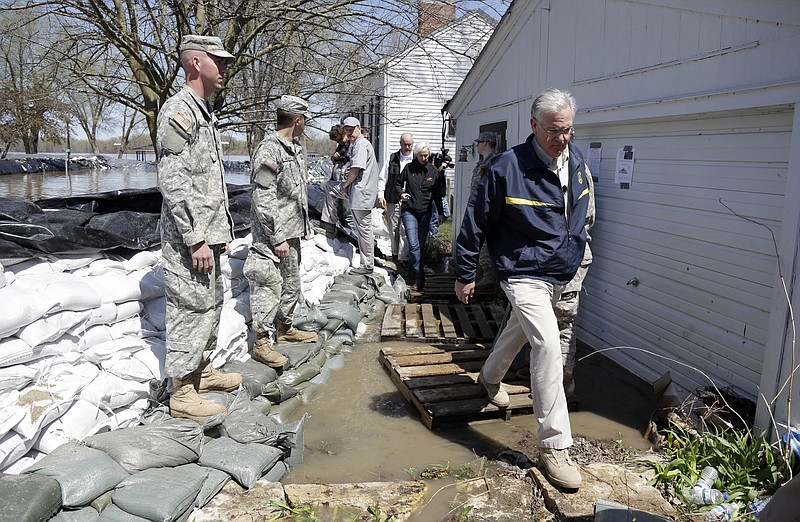CLARKSVILLE (AP) - Her Missouri hamlet soon to celebrate its 200th birthday, Mayor Jo Anne Smiley embraces Clarksville's perilous place along the Mississippi River, never mind that the waters again threaten to wipe it and its potpourri of specialty shops off the map.
In places like Clarksville and the Illinois town of Grafton just across the river, it's always been the clear views of the Mississippi drawing the tourists, unobstructed by a permanent levee. But that's left both communities north of St. Louis vulnerable.
By Monday, the rain-swollen river strained a hastily erected makeshift floodwall in Clarksville, creating two trouble spots that volunteers were scrambling to patch - as well as build a second sandbag wall to catch any water weaseling through.
But though the Mighty Mississippi is starting to recede, another batch of rain threatens to push it back up. A swath from Oklahoma through Michigan is forecast to get an inch of rain - in some cases slightly more - through Tuesday. The National Weather Service said some river levels again could rise, blunting their slow retreat.
Mark Fuchs, a National Weather Service hydrologist, said the latest dousing could be especially troubling for communities along the Illinois River, which he said is headed for record crests.
"Along the Illinois, any increase is going to be cause for alarm, adding to their uncertainty and, in some cases, misery," he said late Monday afternoon.
Last week's downpours brought on sudden flooding throughout the Midwest, and high water is blamed for at least three deaths. Authorities in LaSalle, Ill., spent Monday searching for a woman whose van was spotted days earlier near a bridge over the flooded Illinois, and a 12-year-old boy was in critical condition after being pulled from the Big River near Leadwood, about 65 miles south of St. Louis, after floodwaters swept him away as he tried to walk across a bridge.
Flooding along the Mississippi doesn't have the impact today that it had during the Great Flood of 1993. Since then, thousands of homes have been bought out, so the flood plain in many places is largely green space. Other places have built better flood walls and levees.
But in flood-prone Clarksville, putting up permanent protection against the river is a non-starter, partly because it could cost millions of dollars the 442-person community can ill-afford without plenty of taxpayer help.
More importantly, Smiley and others say, building a flood wall would amount to sacrificing Clarksville's identity.
"The Mississippi River is out there, and we live on it," Smiley said in the town where 6,000 tons of sand has been crafted into the latest makeshift wall by locals, the National Guard and even prison inmates. "We are a tourist town, and part of that involves seeing and experiencing the river."
The hamlet is currently working with the Army Corps of Engineers on a master flood plan, and Smiley said one option involves buying a metallic, interlocking flood wall that doesn't require sand and can go up fast in a flood event. But that approach is expensive: A mile-and-a-half stretch would cost millions of dollars, not to mention the money needed for equipment to move it and places to store it.
Smiley and her Grafton counterpart, Tom Thompson, say erecting a levee could cause headaches for property owners by dispersing the water onto their land, much of it fields. But they acknowledge those concerns are secondary to the central objection - levees block river views.
"There's no desire for a levee, and we would fight that," Thompson said.

